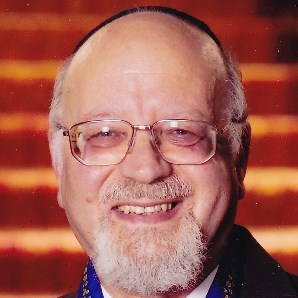News
Parsha Vayyechi – moulding your own destiny
Rabbi Dr Raymond Apple writes: “On his death bed Jacob wants to reveal the future to his children – “Gather and let me tell you what will befall you at the end of days” – but God prevents this from happening (Rashi on Gen. 49:1).”

We can understand that knowing the future might not be good for us, but if so why does Jacob now proceed to spell out the destiny of each one of his children in turn? Surely that is a contradiction of the sages’ comment that the Divine Presence departed from the patriarch and he turned to other matters.
Actually it is not such a contradiction. What Jacob begins by wanting is to tell the story in the passive – “what will befall you at the end of days”, what history will do to them in years to come. The change that comes about when he turns to each child individually is the implication that history will not just happen to them but they will make it themselves.
Each child has a duty to recognise their own character with all its strengths and failings. Each one will make and mould their own destiny. The Children of Israel collectively are responsible for their own future. The question is not what history will do them but what they will do to history.
JUDAH’S TRIBUTE
Jacob says (Gen. 49:10), “The sceptre shall not depart from Judah until ‘Shiloh’ comes”.
Depending on how it is interpreted, “Shiloh” – probably from a root that means tranquillity or peace – might be a person, a place, or not a proper noun at all. Christianity links it with Jesus. The Talmud (Sanh. 98b) sees it as a messianic reference. Other views think the Messiah might be named Yinon, Chaninah or Menachem, none of which have doctrinal significance. The Targum renders “Shiloh” as “Messiah”, so why would Jacob use the word in this sense?
Rabbinic commentary offers other interpretations of “Shiloh”, such as “his son’s sons” (i.e. Judah’s final descendant/s), linking “Shiloh” with “shilyatah” in Deut. 28:57, a rare word that denotes “afterbirth”, making “Shiloh” a metaphor for posterity and destiny. The Septuagint regards the word as a compound, “shello”, “that which is his”, so that the verse would mean “until his (Judah’s rightful) destiny is fulfilled”.
There is a place in central Israel called Shiloh, where the Tabernacle stood from the days of Joshua until the time of the Philistines. Hannah and her husband Elkanah, parents of Samuel, came there to worship. The city’s fall became a poetic byword. Jacob’s statement to Judah might be taken as meaning, “Until he comes (or ‘as long as people come’) to Shiloh”, but Shiloh fell before Judah’s eminence began.
The Midrash sees “Shiloh” as a derivative from “shai”, “a tribute”, i.e. “So long as tribute is brought to him (Judah)”. The Jewish Publication Society translation says, “so that tribute shall come to him”. The implication is that for as long as Judah’s eminence is acknowledged, he shall hold leadership. Since the verse goes on to say (JPS version), “The homage of peoples be his”, the context is the status of Judah.
FLAWED LEADERSHIP
As the first-born son, Reuben should have been the leader of his family: “Reuben,” said Jacob, “you are my first-born; to you belongs the excellency of dignity and power” (Gen. 49:3). But a good father knows the character of each of his children, and Jacob saw Reuben as too flawed in personality to deserve pre-eminence over his brothers.
What stood in Reuben’s way? Jacob’s answer is clear: “Unstable as water, you will not have the excellency” (verse 4). Rashi explains, “You are quick-tempered, like water which rushes in its flow”.
Why does Jacob overlook not only Reuben, but the next two sons, Shimon and Levi, too?
Because “weapons of war are their livelihood… cursed be their anger, for it is fierce” (verses 5-7). Like Reuben, they have an unstable personality and cannot control their passions.
Who then secures Jacob’s confidence? Judah, the next son: “Judah, it is you whom your brothers shall praise” (verse 8).
Though no paragon of virtue, Judah has a calmer disposition than his brothers: “He kneels down and rests like a lion… who shall rouse him up?” (verse 9). Judah does not jump up and lash out. He shows enough serenity to control his tongue and his actions. Judah can be relied upon more than his older brothers can. He does not speak or act hastily or impetuously. Too much is at stake. His decisions are carefully thought out and enunciated calmly.
This trait is “yishuv hada’at”, equilibrium, abbreviated as “yishuv”, sedateness, which is one of the 48 paths to Torah (Avot 6:6). Like leadership, Torah knowledge is compromised if one is in too much of a hurry to consider where the truth really lies.
- Rabbi Apple served for 32 years as the chief minister of the Great Synagogue, Sydney, Australia’s oldest and most prestigious congregation. He was Australia’s highest profile rabbi and held many public roles. He is now retired and lives in Jerusalem. Rabbi Apple blogs at http://www.oztorah.com
Denis Solomons
December 30, 2014 at 12:05 pm
‘Was Jacob able to see the future ?
He was a prophet but did he have clairvoyant properties ?
And why did he want to reveal the future on his deathbed ?
There are more questions than answers .
And did his children want to know the future ! ?’
Choni
December 31, 2014 at 6:55 am
‘Hello Dennis,
I suggest you direct biblical questions to your ‘local’ Rabbi.
Not to a ‘secular’ forum like SAJR.
Regards’